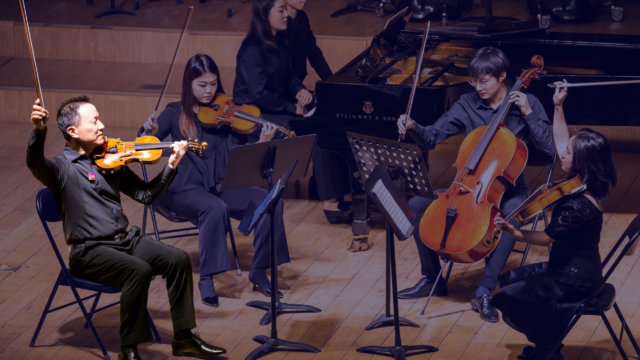NEA Updates, Worldwide Vote on Bows, 2026 Giving Resources, and More
November 21, 2025
In This Issue
- Shutdown Ends, Advocacy and Federal Action Continues
- Latest News on NEA Grants Process
- Action Next Week on Worldwide Use of Bows
- Major Programmatic Transfers from U.S. Department of Education
- Individual Giving Adjusts as Tax Policies Change
- Visa Processing Address Changes
Shutdown Ends, Advocacy and Federal Action Continues
The longest U.S. federal shutdown ended last week, and policymakers need to know what their constituents care about and how their communities are faring. It doesn’t require a crisis to get in touch—in fact, the best initial point of contact is a proactive one. Now is an optimal time to engage your elected officials and show them your orchestra in action. Let policymakers and their staff know what kind of community events are taking place and invite them to get better acquainted with the work your orchestra does—on stage and off, and let us know how those interactions go so we can keep reinforcing each other’s work! The League’s Playing Your Part guide to advocacy has all the tips and tools you need.
Latest News on NEA Grants Process
As orchestras begin to receive FY26 award notifications, the League continues to update its dedicated page about the NEA Grants Process to reflect the latest implications of court action, funding cycles, and what we know about how executive actions affect grantee compliance requirements. In addition to updates to that page, the League also continues to add guidance documents to our Resources for Navigating the Changing Landscape.
Action Next Week on Worldwide Use of Bows
String players and music stakeholders worldwide are engaged in essential conversations about the future of the wood used in many bows. The 185 global parties to the Convention on International Trade in Endangered Species of Wild Fauna and Flora (CITES) are preparing to vote next week on the rules for Pernambuco wood, next steps for the CITES Musical Instrument Certificates, and a host of broader conservation policies. The League will attend the November convening of the 20th Conference of the Parties (CoP20) in Samarkand, Uzbekistan, where conversations will unfold on a proposal by Brazil to list Pernambuco at the highest level of protection, requiring permits for all international travel with Pernambuco bows in use by many musicians, and placing a near-ban on international sales of existing and new bows. The League has been speaking up on these issues in collaboration with a wide range of international stakeholders, including NAMM, the American Federation of Musicians of the United States and Canada, the Ibero-American Network of Symphony Orchestras, and many others. Keep up with all developments in the League’s Pernambuco Policy Resource Page and find out how to participate in our long-term Know Your Bow efforts.
Major Programmatic Transfers from U.S. Department of Education
This week, the U.S. Department of Education (USDE) signed six interagency agreements to transfer management of several programs to the Departments of Labor, Interior, State, and Health and Human Services. The Department of Labor will assume management of the Office of Elementary & Secondary Education programs, which includes the Office of Well-Rounded Education and administers all of the grant programs authorized under the Every Student Succeeds Act (ESSA). For federal arts policy advocates, this program includes Titles I, II, IV-A, and the Assistance for Arts Education program.
A Q and A indicates that the Department of Labor will provide grant administration services, including managing competitions, while the USDE “will maintain all statutory responsibilities and will continue its oversight of these programs.” The Q and A also indicates that states “will continue receiving all title formula funds — including those that support low-income students, teachers, academic enrichment, and after-school programs. States will now receive these funds from DOL.” This agreement commences immediately and remains in effect until terminated.
Arts advocates are urging Congress to protect and sustain essential federal funding that supports access to a complete education for all students. You can speak up using the tools available in the League’s FY26 Arts Education campaign.
Individual Giving Adjusts as Tax Policies Change
Philanthropy is essential fuel for the work orchestras do in communities nationwide. Many donors are changing their year-end giving plans now, before new tax policies kick in, and are also considering shifts to giving strategies for 2026. New information is available in the Fundraising Effectiveness Project’s latest quarterly report on giving, the Association of Fundraising Professionals’ one-pager overview on the new charitable deduction for non-itemizers, and the Benefactor Group’s latest article, The Tax Code Is Changing; How Will Donors Respond? You can find these and other resources in the League’s Philanthropic Trends Resource Center.
Visa Processing Address Changes: Grace Period Ends Next Week
Following the government shutdown, those engaged in the artist visa process are watching for even longer delays from start to finish. The requirements for how to file petitions and pay related fees have changed significantly in recent months and the very latest change involves where to file O and P visa petitions. After more than two years of arts petitioners adjusting to a single service center in Texas, USCIS has expanded the locations where petitions must be sent, and there are numerous factors that determine the correct location for each type of petition. Getting the details right is essential, otherwise USCIS will reject a petition and precious time will be lost. Make sure to catch up on the League’s latest news alerts from our Artists from Abroad website to learn more.
Related
-
Learn | Governance
Spotlight: Sarah Generes
-
Learn | Travel with Instruments
Know Your Bow: New Rules and Essential Steps for Pernambuco Sustainability
Become a member
Thank you for your interest in the League of American Orchestras! We are dedicated to advancing the orchestral experience for all.
Join Now
